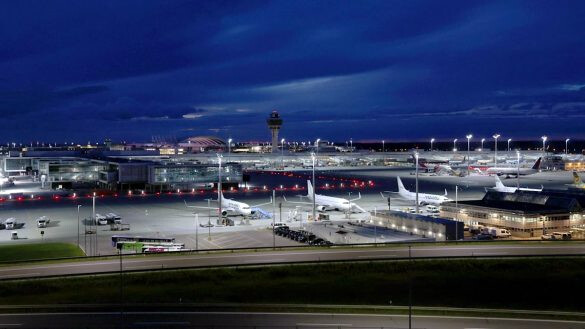
BERLIN—Germany's Munich Airport, the country's second-largest air hub, experienced consecutive day closures this week after multiple sightings of unidentified drones near its airspace. The repeated disruptions, which affected thousands of passengers, underscore a growing security challenge across Europe, where numerous airports and critical infrastructure sites have recently been targeted by suspicious drone activity.
On the evening of October 3, local time, the airport completely shut down its runways after initial reports of two drones. Although federal police confirmed the sightings, the drones vanished before their origins could be identified. The closure, the second in as many days following a similar incident on the night of October 2, resulted in significant travel chaos. Twenty-three inbound flights were diverted to other airports, and 12 were canceled. A total of 46 departing flights were also scrapped, impacting an estimated 6,500 passengers—a figure in addition to the nearly 3,000 affected by the previous night's shutdown.
The incident in Munich is the latest in a wave of drone-related disruptions across the continent, raising serious concerns about the vulnerability of key infrastructure. In the preceding weeks, airports in Denmark (including Copenhagen, Aalborg, and Billund), Norway (Oslo), and the Czech Republic (Prague's Václav Havel Airport) all reported drone sightings that led to temporary closures.
Russian Hybrid Warfare Suspected
European authorities are increasingly operating under the suspicion that this coordinated drone activity may be linked to a form of "hybrid warfare" orchestrated by Russia, though concrete evidence remains elusive. This hypothesis gained traction after a Russian drone was reportedly shot down over Poland last month.
Germany has seen multiple such incidents, with air traffic controllers reporting 35 cases of drone interference at Frankfurt Airport alone this year. However, not all incidents have an apparent geopolitical link. On October 3, a 41-year-old man was arrested for flying a drone over Frankfurt Airport. Police emphasized he was not linked to Russia, dismissing his drone as a common, "cheap" device.
EU Divided on Counter-Drone Strategy
In response to the escalating threat, the European Union is scrambling to devise a unified defense strategy, with discussions focusing on creating a robust "drone defense wall"—a coordinated network of radar and interception equipment—along the bloc's eastern frontier. EU regulations already strictly prohibit drone flights near critical facilities like airports and military bases.
However, the proposal to fund and implement a collective defense system is facing internal division. Eastern member states bordering Russia, such as the Baltic nations, are vocal advocates for the initiative. In contrast, leaders from countries like France, Italy, and Greece have expressed skepticism, arguing that the security benefits should not be narrowly focused on the eastern countries and that the EU should not overreach into national defense policy.
French President Emmanuel Macron cautioned against the illusion of a flawless defense, noting, "There is no perfect wall in Europe. Do you think we can perfectly defend the 3,000 kilometers of border (between Russia and the EU)? The answer is 'no'."
Meanwhile, Russia has dismissed the European alarm as "hysteria," accusing EU nations of attempting to increase military spending by stoking public anxiety. Russian President Vladimir Putin reportedly mocked the European claims, comparing them to UFO sightings and joking that Russia would stop sending drones.
Analysts view the drone incursions as a calculated move by Moscow to test Europe's preparedness and exploit any existing divisions within the bloc. This internal disagreement threatens to undermine the EU's proposed anti-drone architecture, with some critics suggesting the planned "drone wall" is showing "cracks" even before its construction begins.
[Copyright (c) Global Economic Times. All Rights Reserved.]




























